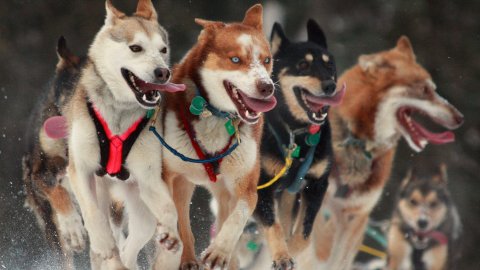Climate Change Threatens to Halt Alaska’s Sled Dog Races

NPR’s Emily Schwing reports on some recent climate-change developments that are affecting Alaska’s Yukon Quest and Iditarod sled dog races. Officials and mushers are beginning to wonder how long the state sport will be able to survive these drastic changes with warm temperatures threatening food supplies and the landscape of the race.
The mushers have already begun to look at their environment and how they train their dogs with a different kind of race in mind. Open water is looked at with a wary gaze, as Hank DeBruin of Ontario tells Schwing about a recent close call he had:
“I was sleeping in my sled bag and I heard a roar, sounded like freight train. So I threw all my stuff in the sled bag, pulled my dogs and my sled up the bank a bit and turned around, and there was wide-open water where the sled was sitting five minutes earlier.”
Dogs are also being trained to run more at night, when the temperatures are colder — better conditions for the dogs, who usually enjoy sub-zero temperatures. Likewise, the rising temperatures are causing mushers to pack their food differently. Usually, they break off frozen chunks of meat for their dogs, but food is now exposed to warmer temperatures, making it thaw and spoil easily. So, some mushers have taken to insulating their food. Raincoats for dogs and musher are also being packed within the sleds — more gear to protect against the new elements that are challenging the racers.
Climatologist Rick Thoman from the National Weather Service spoke to Schwing about the inevitable call officials may have to make one day, saying there could come a day in five or 50 years from now when the warm temperatures will affect whether the race will even happen. Officials already considered moving the starting line of the Yukon Quest race, but a drop in temperatures and a snowstorm allowed them to reconsider.
Being that these sled dog races are Alaska’s official state sport, bringing in tourists, these warming temperatures may cause the state to shift its position to try and find another economic driver. Many people, from farmers to nations, have had to make hefty decisions from whether to stop growing a certain cash crop to stalling a sporting event. The world is, indeed, changing the landscape.
Read more at NPR.
Photo Credit: Frank Kovalchek/Flickr




